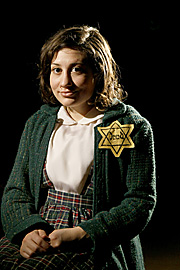Starting March 21, Seattle’s Intiman Theatre will showcase the original stage adaptation of The Diary of Anne Frank.
The play is, without a doubt, one of the most enduring, poetic and moving Holocaust stories to ever be dramatized, and, more than 50 years since it first debuted on Broadway, it still packs theatres and moves audiences.
“The story of Anne Frank is universal,” says actress Shellie Shulkin, who plays Mrs. Van Daan. “The play deals with issues of religion and persecution of this time in history. It is important because each new generation, Jews and non-Jews, need to be educated with the history of the past.”
For weeks, the cast of Anne Frank has been getting as close as they can to recreating the claustrophobic tension of a secret annex above the canals of Amsterdam.
For Matt Boston, who is Jewish and portrays Otto Frank in the production, it is one of the more involved roles he has studied for.
“There’s a mixture of researching the history, understanding these people and trying to grasp the experience of what was happening in Amsterdam and Europe,” Boston says.
“We’ve all read the diaries, but there is a lot of external material and with this play you need to take time,” he adds. “These people had to live in this space for two years, and you have to get a feel for that space and invest in this family and the fight that this family is going through.”
Delving into the characters that make The Diary of Anne Frank brings a great deal of reflection for Boston and other Jewish actors working on the production. It is not only about the roles and characters they take on, but about what it means to be Jewish now and Jewish then.
“I remember seeing Anne Frank for the first time and finding it odd that the prayers during Hanukkah weren’t in Hebrew,” Boston says. “I now understand that Otto Frank didn’t know much Hebrew, that he wasn’t a very religious person; he was culturally German. It was the Holocaust that made him a Jew, and what the Germans did to him, [that] personified him as a Jew.
Identity is an important undercurrent in the play for Shulkin, whose Jewish relatives fled from the Russian pogroms. She believes that both Jews and non-Jews can learn about — and embrace — their own identity through the story of Anne Frank.
“At that time period, because of the Reform Jewish movement that began in Germany, it seems like there was this desire or need to assimilate,” Shulkin says. “They wanted to integrate, [to] get away from the Orthodox roots, and to become German first and Jews second.”
Shulkin, during the interview, read from her notebook a passage she had selected from Anne Frank’s diary.
“I think it is a very appropriate quote that really stood out,” Shulkin says. “”˜One day this terrible war will be over. The time will come when we will be people again and not just Jews! We can never be just Dutch, or just English, or whatever. We will always be Jews as well. But then we will want to be. — Anne Frank, 1944.’”
For Boston, the issues with identity and uncertainty highlight the universal appeal of the play and make it easily accessible for a broader audience who may not be Jewish.
“The challenge is humanizing these people,” Boston says. “We tend to put them on a pedestal, but they are human with their own foibles… [Anne] had such insight, but she had her bad moments. She was in one mood one day and one mood the next, and she changed her mind about a lot of things.”
Lucy DeVito makes her Seattle debut with Intiman as Anne Frank. She finds a lot of her inspiration in the youth, honesty and naiveté of Anne.
“I was a 14-year-old,” DeVito says. “I am sure anyone can relate to the fact of having problems with your mother, father or sister as an outsider, but I think kids are smarter and more sophisticated than adults make them out to be.”
“I try to imagine myself in that situation,” DeVito says. “To be in a stuffy room, to be overwhelmed, and at the same time that you are hearing bombs you are being creative.”
But Anne Frank is more than a diary of young girl. It is a powerful lesson on family, human nature and the human spirit. It is the lessons for humanity that continue to haunt us in her teenage prose, which is as apt now as it was then.
“We are still living in a time where we haven’t really learned the lesson,” DeVito says. “There is genocide happening in this world, and to teach people that this could happen again and anywhere is not that far off. Peace can be obtained but we still need to work to educate people.”
For Boston, education comes through the hope and enduring strength of Anne Frank’s story, its ability to transcend time and to connect people to conflicts.
“Her spirit deserves to be reincarnated because it’s so inspiring,” Boston says. “It’s just as important as [those of] the survivors, the few who are left, who come and talk and remind us that this happened, in a wink of an eye, this was yesterday to them.
“And it can be happening all over the world… try to pick a place in the world where this is not happening to somebody somewhere… people are going to make those connections; we have to.”
Anne’s return
